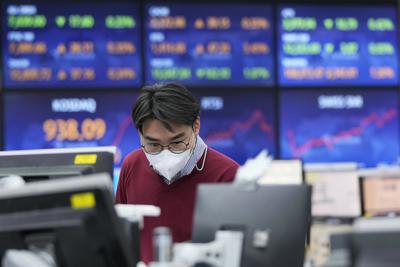Publisher: Maaal International Media Company
License: 465734
Asia stock gauge rises as Hong Kong builders surge
Asian equities rose Tuesday as gains by Hong Kong developers helped overcome a pause in global stocks’ rally. The dollar and Treasuries were little changed, Bloomberg reported.
An Asia stock benchmark climbed as the Hang Seng Index advanced as much as 1.4%, supported by a rally in the shares of real estate developers on speculation of new support measures for the sector. Both subsequently pared gains.
Shares inched higher in Japan while Australian stocks declined ahead of the central bank’s interest rate decision later Tuesday. Contracts for US benchmarks were steady after tech shares led the S&P 500 down Monday, with Apple Inc. wiping out gains of as much as 2% as investors parsed the potential of a new mixed-reality headset.
اقرأ المزيد
Australian government bond yields fell and the currency was little changed as investors awaited the Reserve Bank’s rate announcement. The consensus view is for policymakers to stand pat, though some see the risk of a hike.
If the RBA raises benchmark borrowing costs, “as well as the knee-jerk selloff in rates and support for the Australian dollar this should elicit, much will turn on the accompanying statement and whether the Board thinks further tightening is still likely to be required,” Ray Attrill, head of foreign exchange strategy at National Australia Bank Ltd., wrote in a note.
The dollar weakened against most of its Group-of-10 peers and the yield on the 10-year Treasury was little changed for a second day. Shorter-end US rates edged up after slipping Monday when a report showed the US services sector nearly stagnated in May, causing a re-evaluation of the Federal Reserve’s interest-rate hike path.
Oil declined as traders weighed the outlook for supply and demand following Saudi Arabia’s pledge for extra supply cuts.
The US Treasury on Monday began its bill issuance flood that saw buyers storming into the upsized three- and six-month auctions, a move that many have expected will drain liquidity from the system.
Any move by the government or the Fed that can risk liquidity in the system “is something that will probably keep us in a range-bound mode until we see where it all lands, including the Fed’s final decision on rates,” Sylvia Jablonski, CEO and chief investment officer at Defiance ETF, said on Bloomberg Television.








